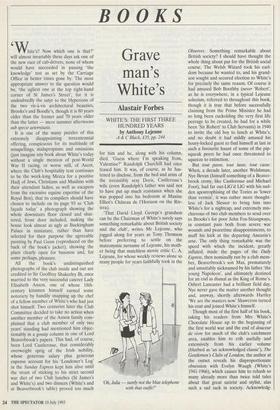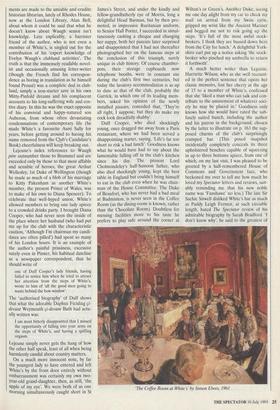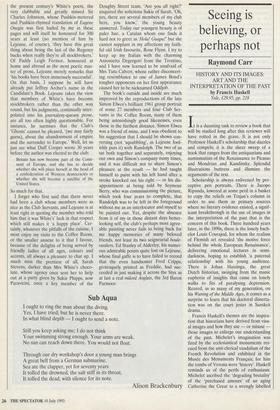BOOKS
Grave man's White's
Alastair Forbes
WHITE'S: THE FIRST THREE HUNDRED YEARS by Anthony Lejeune A & C Black, .£3.5, pp. 244 White's? Now which one is that?' will almost invariably these days ask one of the new race of cab-drivers, none of whom would have succeeded in passing 'the knowledge' test as set by the Carriage Office in better times gone by. The most appropriate answer to the question would be, 'the ugliest one at the top right-hand corner of St James's Street', for it is undoubtedly the satyr to the Hyperions of the two vis-à-vis architectural beauties, Brooks's and Boodle's, though it is 80 years older than the former and 70 years older than the latter — mere summer afternoons sub specie aeternitatis.
It is one of the many puzzles of this extremely disappointing tercentennial offering, conspicuous for its multitude of misspellings, malapropisms and omissions (just imagine any book about White's today without a single mention of post-World War II racing, or worse still, of Ascot, where the Club's hospitality tent continues to be the week-long Mecca for a positive Hadj of Jews, Christians and Muslims with their attendant ladies, as well as escapers from the excessive equine expertise of the Royal Box), that its compilers should have chosen to include on its page 93 as 'Club façade today' a photograph showing the whole downstairs floor closed and shut- tered, front door included, making the house look almost as ugly as Buckingham Palace in miniature, rather than have selected for their purpose the agreeable painting by Paul Gunn (reproduced on the back of the book's jacket), showing the place clearly open for business and, for some perhaps, pleasure.
All the book's undistinguished photographs of the club inside and out are credited to Sir Geoffrey Shakerley Bt, once married to the very successful caterer Lady Elisabeth Anson, one of whose 18th- century kinsmen himself earned some notoriety by handily snapping up the chef of a fellow member of White's who had just shot himself. Two centuries later the Club Committee decided to take no action when another member of the Anson family com- plained that a club member of only two years' standing had mentioned him objec- tionably in a gossip column in one of Lord Beaverbrook's papers. This had, of course, been Lord Castlerosse, that considerably overweight sprig of the Irish nobility, whose generous salary plus generous expense account for his 'Londoner's Log' in the Sunday Express kept him alive until the strain of sticking to his strict second war diet of two Club lunches (St James's and White's) and two dinners (White's and at Beaverbrook's table) proved too much for him and he, along with his column, died. 'Guess where I'm speaking from, Valentine?' Randolph Churchill had once teased him. It was, of course, as he has- tened to disclose, from the bed and arms of the irresistibly sexy Doris, Castlerosse's wife (even Randolph's father was said not to have put up much resistance when she was popped into his bedroom at Maxine Elliot's Chateau de ('Horizon on the Riv- iera).
`That David Lloyd George's grandson can be the Chairman of White's surely says something remarkable about British society and the club', writes Mr Lejeune, who jogged along for years as Tony Thomson before preferring to settle on the matronymic surname of Lejeune, his moth- er being that matchless movie critic C. A. Lejeune, for whose weekly reviews alone so many people for years faithfully took in the 'Oh, Julia — surely not the blue telephone with that outfit?' Observer. Something remarkable about British society? I should have thought the whole thing about par for the British social course. The Welsh Wizard took his earl- dom because he wanted to, and his grand- son sought and secured election to White's for precisely the same reason. Of course it had amused Bob Boothby (never 'Robert', as he is everywhere, in a typical Lejeune solecism, referred to throughout this book, though it is true that before successfully claiming from the Prime Minister he had so long been cuckolding the very first life peerage to be created, he had for a while been 'Sir Robert' to Club Servants) in 1940 to invite the old boy to lunch at White's, and no doubt it had mildly amused his hoary-locked guest to find himself at last in such a favourite haunt of some of the pip- squeak peers he had once threatened to squeeze to extinction.
But tout passe, tout lasse, tout casse. When, a decade later, another Welshman, Nye Bevan (himself something of a Beaver- brook crony, like Castlerosse and Michael Foot), had far out-LIG'd LIG with his sud- den apostrophising of the Tories as 'lower than vermin', it was rather more thought- less of Jack Slessor to bring him into White's for a nightcap, and extremely mis- chievous of two club members to send over to Brooks's for poor John Fox-Strangways, in constant pain both from severe war wounds and peacetime disappointments, to muff his kick at the departing Aneurin's arse. The only thing remarkable was the speed with which the incident, greatly inflated, made the pages of the Daily Express, then nominally run by a club mem- ber, Beaverbrook's son Max, prematurely and unsuitably nicknamed by his father 'the young Napoleon', and ultimately destined for an end as dismal as the King of Rome's. Osbert Lancaster had a brilliant field day, Nye never gave the matter another thought and, anyway, shortly afterwards Hartley 'We are the masters now' Shawcross turned his coat and joined White's himself.
Though most of the first half of his book, taking his readers from Mrs White's Chocolate House up to the beginning of the first world war and the end of douceur de vivre for much of the club's catchment area, enables him to crib usefully and extensively from his earlier volume (blurbed as 'an acknowledged classic'), The Gentlemen's Clubs of London, the author at the outset reveals his disproportionate obsession with Evelyn Waugh (White's 1941-1966), which causes him to rehash so many already more than twice told tales about that great satirist and stylist, alas such a sad sack in society. Acknowledg- ments are made to the amiable and erudite historian librarian, lately of Rhodes House, now at the London Library, Alan Bell, about whom it could be said that what he doesn't know about Waugh senior isn't knowledge. Less explicably, a barrister friend of the author, who is not even a member of White's, is singled out for the contribution of his 'expert knowledge of Evelyn Waugh's clubland activities'. The truth is that the immensely readable novel- ist and occasionally amusing letter-writer (though the French find his correspon- dence as boring in translation as he himself found Proust) was a complete dud in club- land, simply a non-starter save in his own Mitty-Pinfold dreams and his complacent accounts to his long-suffering wife and cos- tive diary. In this he was the exact opposite of his convivial and happy-natured son Auberon, from whose often devastating condemnations of contemporary life (he made White's a favourite Aunt Sally for years, before getting around to having his name removed from the club's Candidate's Book) cheerfulness will keep breaking out.
Lejeune's index references to Waugh pere outnumber those to Brummel and are exceeded only by those to that most affable and sensible of heroes, the great Arthur Wellesley, 1st Duke of Wellington (though he made as much of a blob of his marriage to Kitty Pakenham as another White's member, the present Prince of Wales, was to make of his own to Diana Spencer). To celebrate that well-hyped union, White's allowed members to bring one lady apiece to a crowded drinks party. I brought Diana Cooper, who had never seen the inside of the place where her husband (who had put me up for the club with the characteristic caution, 'Although I'm chairman my candi- dates are often pilled') had spent so many of his London hours. It is an example of the author's painful prissiness, excessive surely even in Pinner, his habitual dateline as a newspaper correspondent, that he should write of one of Duff Cooper's lady friends, having failed to notice him when he tried to attract her attention from the steps of White's, wrote to him of 'all the good men going to waste behind the bow window'.
The 'authorised biography' of Duff shows that what the adorable Daphne Fielding ci- devant Weymouth gi-devant Bath had actu- ally written was: I am most bitterly disappointed that I missed the opportunity of falling into your arms on the steps of White's, and having a spiffing orgasm.
Lejeune simply never gets the hang of how the other half speak, least of all when being harmlessly candid about country matters.
On a much more innocent note, by far the youngest lady to have entered and left White's by the front door entirely without embarrassment was certainly my own two- year-old grand-daughter, then, as still, 'the apple of my eye'. We were both of us one morning simultaneously caught short in St James's Street, and under the kindly and fellow-grandfatherly eye of Morris, long a delightful Head Barman, but by then pro- moted, in impressive Ruritanian uniform, to Senior Hall Porter, I succeeded in simul- taneously cashing a cheque and changing her nappy, both her parents later surprised and disappointed that I had not thereafter photographed her on the famous steps at the conclusion of this triumph, surely unique in club history. Of course chamber- pots, their storage cupboards now telephone booths, were in constant use during the club's first two centuries, but today the lavatory accommodation is as up to date as that of the club, probably the Garrick, in which one of its leading mem- bers, asked his opinion of the newly installed pissoirs, conceded that, 'They're all right, I suppose, but they do make my cock look dreadfully shabby'.
Duff Cooper, who died shockingly young, once dragged me away from a Paris restaurant, where we had been served a disappointing starter, saying, 'Life's far too short to risk a bad lunch'. Goodness knows what he would have had to say about the lamentable falling off in the club's kitchen since his day. The present Lord Cholmondeley's half-Sassoon father, who also died shockingly young, kept the best table in England but couldn't bring himself to eat in the club even when he was chair- man of the House Committee. The Duke of Beaufort, who has never had a bad meal at Badminton, is never seen in the Coffee Room (as the dining-room is known, rather than the Chocolate Room). Doubtless for messing facilities more to his taste he prefers to play safe around the corner at
Wilton's or Green's. Another Duke, seeing me one day alight from my car to check my mail on arrival from my Swiss eyrie, gripped my wrist like the Ancient Mariner and begged me not to risk going up the steps. 'It's full of the most awful stock- brokers. I think they are bussed down here from the City for lunch.' A delightful York- shire earl put up a notice asking 'the stock- broker who pinched my umbrella to return it forthwith'.
A much better writer than Lejeune, Harriette Wilson, who as she well recount- ed in the perfect sentence that opens her classic memoirs, lost her cherry at the age of 15 to a member of White's, confessed that she 'liked a man who can talk and con- tribute to the amusement of whatever soci- ety he may be placed in.' Goodness only knows how she would have rated the sub- fuscly suited bunch, including the author and his patron in the background, chosen by the latter to illustrate on p. 163 the sup- posed charms of the club's surprisingly cramped bar. (This posed snapshot incidentally completely conceals its three upholstered benches capable of squeezing in up to three bottoms apiece, from one of which, on my last visit, I was pleased to be greeted by a half-remembered House of Commons and Government face, who beckoned me over to tell me how much he loved my Spectator letters and reviews, suit- ably reminding me that his new noble name was `Fanshawe' no less.) The late Sir Sachie Sitwell disliked White's bar as much as Paddy Leigh Fermor, at such enviable length, hated The Spectator review of his admirable biography by Sarah Bradford. don't know why', he said to the greatest of 'The Coffee Room at White's' by Simon Elwes, 1961 the present century's White's poets, the very clubbable and greatly missed Sir Charles Johnston, whose Pushkin-metered and Pushkin-rhymed translation of Eugene Onegin was first hailed by me in these pages and will itself be honoured for 300 years at least (no mention of him by Lejeune, of course), 'they have this great thing about being the last of the Regency bucks when really they're all stockbrokers.' Of Paddy Leigh Fermor, honoured at home and abroad as the most poetic mas- ter of prose, Lejeune merely remarks that `his books have been immensely successful'. On that basis, I suppose he will have already put Jeffrey Archer's name in the Candidate's Book. Lejeune takes the view that members of White's have become stockbrokers rather than the other way round, but his judgments, continually inter- polated into his journalesy-queasy prose, are all too often highly questionable. For instance, he surmises that the Club's `Ghosts' cannot be pleased, '(we may fairly guess), about the abandonment of empire and the surrender to Europe.' Well, let us just see what Duff Cooper wrote 30 years before the author was elected to the club:
Britain has now become part of the Conti- nent of Europe, and she has to decide whether she will place herself at the head of a confederation of Western democracies or whether she will become a satellite of the United States.
So much for that.
I forget who first said that there never had been a club whose members were as nice as the Club Servants, and Lejeune is at least right in quoting the member who told him that it was White's' luck in that respect which still makes it 'a happy place'. Cer- tainly, whatever the pitfalls of the cuisine, I most enjoy my visits to the Coffee Room, or the smaller annexe to it that I favour, because of the delights of being served by friendly ladies of all ages, colours and accents, all always a pleasure to chat up. I much miss the prettiest of all, Sarah Stevens, darker than Mrs White's choco- late, whose agency once sent her to help out at a party given by Sukie Phipps, now Paravicini, once a key member of the Doughty Street team. 'Are you all right?' enquired the solicitous Sukie of Sarah. 'Oh, yes, there are several members of my club here, you know,' the young beauty answered. Today our youngest beauty is of paler hue, a Catalan whom one finds it hard not to greet as 'Nola! Guapa!' but she cannot supplant in my affections my faith- ful old Irish favourite, Rose Flynn. I try to keep up my Italian with the charming Antonietta Degregori from the Trentino, and I have now learned to be unafraid of Mrs Tutu Calvert, whose rather disconcert- ing resemblance to one of James Bond's tougher opponents on her first appearance caused her to be nicknamed Oddjob.
The book's outside and inside are much improved by the reproductions of the late Simon Elwes's brilliant 1961 group portrait of some 27 members and four Club Ser- vants in the Coffee Room, many of them being astonishingly good likenesses, even those in the furthest distance. Simon Elwes was a friend of mine, and I was obedient to his suggestion that I should be shown con- versing (not 'squabbling', as Lejeune fool- ishly puts it) with Randolph. The two of us sat both together and separately, enjoying our own and Simon's company many times, and it was difficult not to share Simon's pleasure at the result — he had taught himself to paint with his left hand after a stroke knocked out his right — or his dis- appointment at being told by Seymour Berry, who was commissioning the picture, which took four years to complete, that Randolph was to be left in the foreground without me as an interlocutor and myself to be painted out. Yet, despite the absence from it of my in those distant days better- looking self, the club's perhaps most agree- able painting never fails to. bring back for me happy memories of many beloved friends, not least its two seigneurial boule- vardiers, Ed Stanley of Alderley, his numer- ous admirable points quite lost on Lejeune, whose final gaffe is to have failed to record that the even handsomer Fred Cripps, grotesquely printed as Freddie, had suc- ceeded in just making it across the Styx as at last a real milord Anglais, the 3rd Baron Parmoor.




















































 Previous page
Previous page